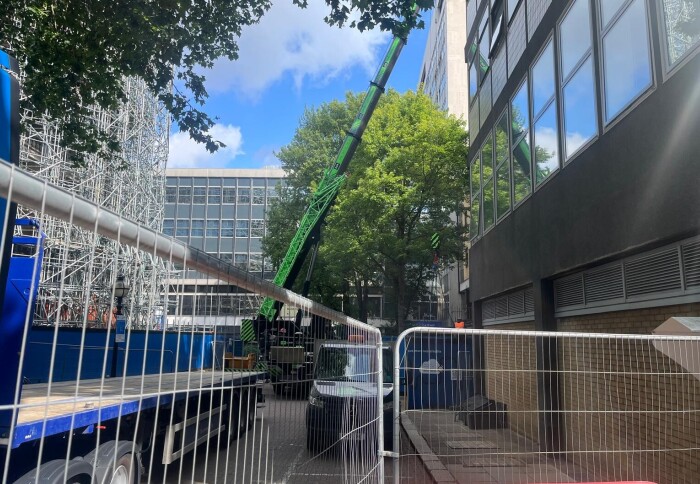Out of steam
by Jan Carberry

We’ve done it! The last traces of the old steam heating and hot water network have been removed from South Kensington Campus.
As the temporary infrastructure and safety hoardings are removed over the rest of the summer, and space returned to normal use, it will soon be forgotten what a transformation has taken place. Completion of this major programme ends our reliance on old gas-fired steam boilers, aging infrastructure up to 60 years old in places, and reduces our carbon footprint towards achieving a net zero estate by 2040.
In 2022 Imperial was awarded a Public Sector Decarbonisation Scheme grant of more than £12m which contributed towards the circa £40m cost of this project to remove the steam-based heating network, one of the largest in London.
By moving the whole of the South Kensington Campus to a low temperature hot water system running at 80oC we are prepared for future heat decarbonisation as part of the Net Zero Strategy.
While there are some steam-specific services remaining on campus, these are purely for necessary research programmes and not part of the heating and hot water network.
Benefits
The benefits of the works are significant:
- The three new boilers, while gas, are much more efficient that the old ones increasing from 79% to 87% efficiency, 8% more efficient at converting natural gas to useful heat. It might not sound much but it has a significant impact. They also ‘extract’ more of the waste heat making the system significantly more efficient than the previous system, using only the equivalent of around 1000 domestic systems expected to reduce CO2 by more than 2,400 tonnes per annum.
- The removal of the steam and condensate networks, although much harder to quantify should result in significant reductions on the thermal demand of the campus.
- Inherent safety benefits of not circulating 180oC steam; no longer having to comply with pressure systems regulations and having replaced plant with new which will be more reliable and have higher availability.
- A significant reduction in NOx emissions, associated with poor air quality and respiratory conditions. This is currently being quantified and opens the possibility in the future to doing further work to further reduce NOx emissions.
- We now have more control points in the heating system, allowing for better management of the system and therefore reduced running costs.
- Our buildings made safer by the removal of asbestos at a cost of £1m.
Temporary steam and Low Temperature Hot Water (LTHW boilers), supported by local boilers supplied the heat throughout last winter. As with any ambitious project there were some difficulties, temporary interruptions to heating and hot water in specific areas, and some slightly cooler than usual temperatures on occasions. Thanks go to everyone across the campus who bore with this for the long-term benefits ahead.
Vital Energi MSL, PIMS, were delivery partners, and our Project Management Consultant Arup, working with our in-house Special Projects Programme Manager Rod Coppard.
What's been achieved
Looking back at what has been done:
- the removal of three large end of life steam boilers and replacement with three new water boilers with integrated heat recovery units
- hundreds of metres of water network pipes replaced with larger, higher capacity pipes, which can carry more heat through them
- plant replaced with new systems and modifications where steam remains necessary for research purposes
- contractors often working simultaneously in nine phased works packages, with 20 buildings updated, to keep buildings running, multiplied by putting in and taking out temporary infrastructure in every case.
It has been a remarkable engineering and logistics achievement in a very short time frame.
Article text (excluding photos or graphics) © Imperial College London.
Photos and graphics subject to third party copyright used with permission or © Imperial College London.
Reporter
Jan Carberry
Estates Division